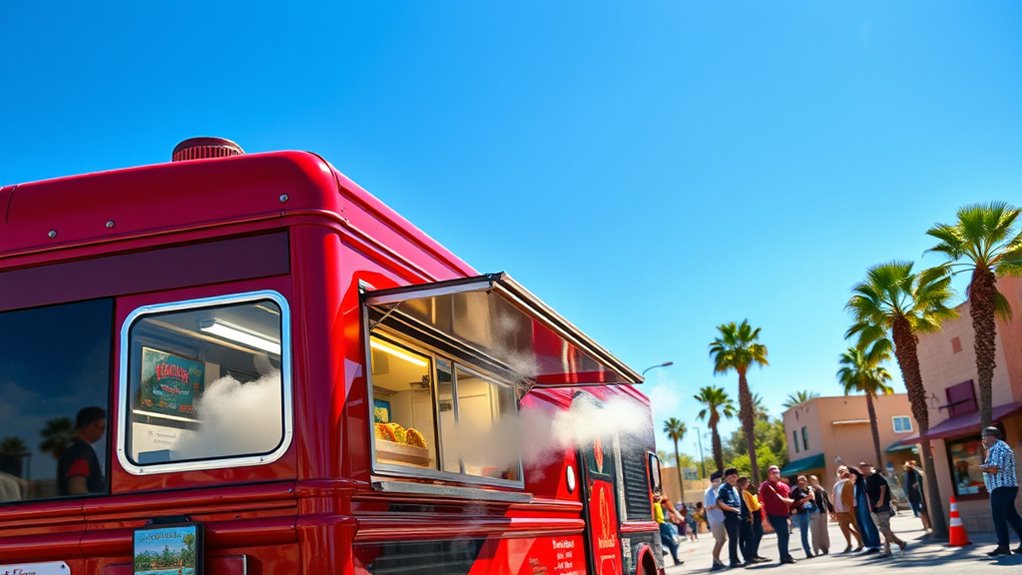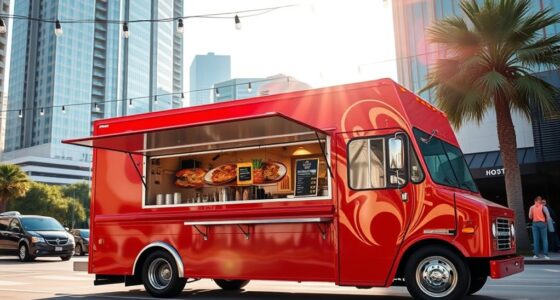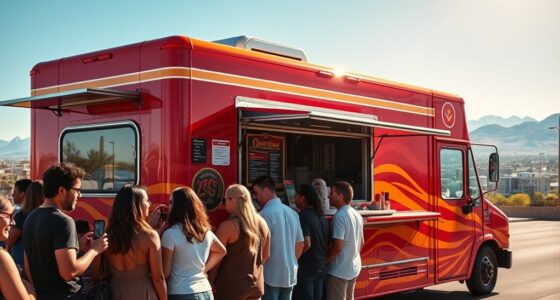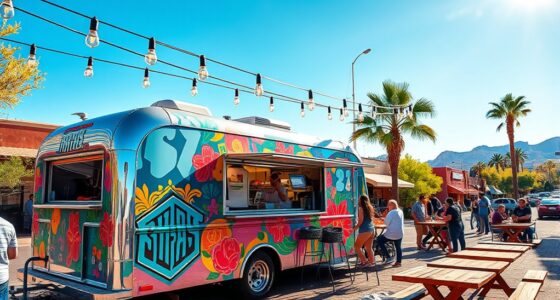To start a food truck in Bakersfield, CA, you’ll need to obtain the necessary permits through the city’s online system, choose a suitable shared kitchen for your operations, and guarantee your equipment meets local licensing requirements. Focus on creating strong branding and eye-catching visuals to attract customers. Keep records of sanitation and maintenance, and plan your menu and pricing carefully. If you keep exploring, you’ll find detailed steps to launch your food truck successfully.
Key Takeaways
- Obtain necessary permits and licenses through Bakersfield’s online application system, including business registration and health certificates.
- Choose shared kitchen spaces and purchase durable, compliant equipment suited to your menu.
- Maintain sanitation records and ensure proper hygiene practices to meet local health inspection standards.
- Understand parking zone restrictions and use proper signage and branding to maximize visibility and avoid fines.
- Develop a marketing strategy with eye-catching branding, high-quality food photos, and local menu offerings to attract customers.
Starting a Food Truck Business
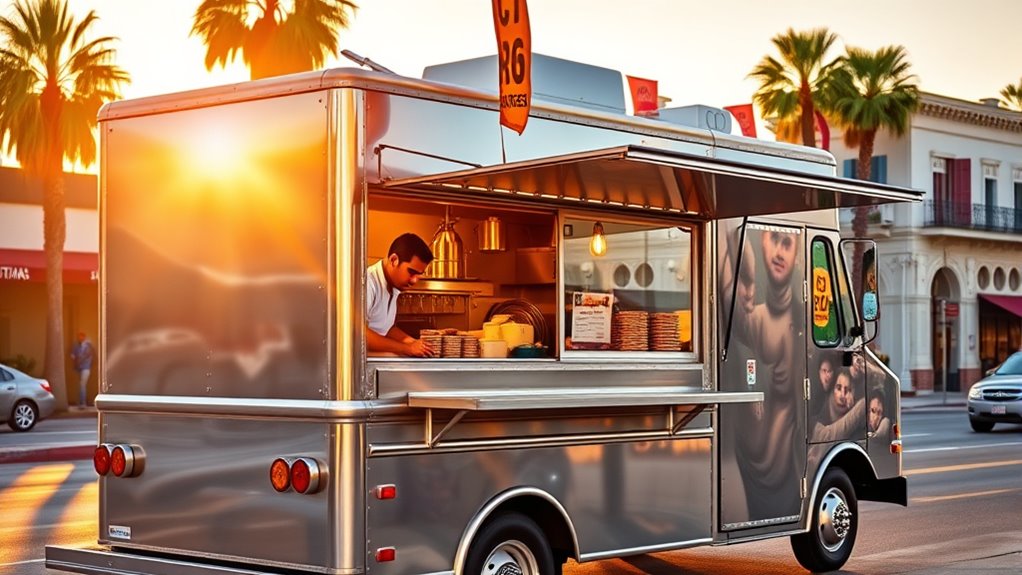
Starting a food truck business can be an exciting way to turn your culinary passion into a profitable venture. The first step is focusing on food truck branding, which sets your truck apart and attracts customers. Your branding should reflect your style, cuisine, and target audience. Next, prioritize menu development by creating a focused, appealing menu that is easy to prepare and transport. Experiment with signature dishes and consider customer preferences in Bakersfield. Keep your menu concise to streamline operations and ensure quality. Once you establish a strong brand and compelling menu, you’ll be ready to design your truck and plan your launch. Remember, clarity and consistency in branding and menu development will help you build a recognizable and successful food truck business. Incorporating leadership skills in your planning and management can also enhance your ability to adapt and grow in a competitive environment.
Understanding Local Requirements

To get your food truck up and running in Bakersfield, you need to understand local requirements like the online permit application process, sanitation protocols, and recordkeeping. You’ll also want to know which street parking zones are designated for food trucks to avoid fines. Staying compliant guarantees your business operates smoothly and within city regulations. Additionally, being aware of cookie consent management helps you understand how online regulations might impact your digital presence and customer interactions.
Online Permit Application Process
Navigating the online permit application process for your food truck in Bakersfield requires understanding the city’s specific requirements and procedures. First, visit the official Bakersfield city website and locate the online permit portal. You’ll need to create an account and gather necessary documents, such as your business license, food handler certificates, and vehicle information. The application process involves filling out detailed forms, specifying your food offerings, and uploading supporting documentation. Be sure to review all instructions carefully to avoid delays. Once submitted, your application will be reviewed by local health and business departments. Keep track of your application status online, and respond promptly to any requests for additional information. Completing the online permit application efficiently ensures your food truck stays on schedule to start serving customers.
Sanitation Protocols and Recordkeeping
After submitting your online permit application, it’s important to familiarize yourself with Bakersfield’s sanitation protocols and recordkeeping requirements. You must maintain proper hygiene and pest control to guarantee food safety. Key steps include:
- Regularly checking and maintaining handwashing stations to promote proper hand hygiene.
- Recording daily cleaning schedules and pest control measures to demonstrate compliance.
- Keeping detailed logs of food storage temperatures and sanitation practices.
These records must be accurate, up-to-date, and easily accessible during inspections. Ensuring your handwashing stations are functional and pest control measures are in place helps prevent contamination and violations. Staying consistent with these protocols not only meets local requirements but also builds customer trust in your food truck’s cleanliness.
Designated Street Parking Zones
Understanding the designated street parking zones in Bakersfield is essential for legal and efficient operation of your food truck. You must pay attention to street signage indicating permitted parking areas and hours. Parking enforcement strictly monitors these zones, and violations can lead to fines or towing. To stay compliant, review local signage carefully and observe posted restrictions. The table below highlights common parking zones:
| Zone Type | Key Details |
|---|---|
| Metered Parking Zones | Paid parking, limited time |
| Permit-Only Zones | Requires special permits |
| No Parking Areas | Street signage prohibits parking |
| Residential Zones | Restricted to residents |
| Commercial Zones | Usually designated for vendors |
Knowing where and when you can park helps avoid penalties and keeps your truck running smoothly.
Setting Up Your Base of Operations

Choosing the right shared kitchen license options can save you time and money while making sure you comply with local regulations. Next, selecting custom kitchen equipment ensures your setup is tailored to your menu and workflow. By focusing on these points, you’ll establish a solid foundation for your food truck operations in Bakersfield. Additionally, understanding storage requirements for your ingredients and supplies can help maintain quality and safety standards.
Shared Kitchen Licensing Options
Setting up your food truck operation often means finding a licensed kitchen space that meets health and safety standards. Shared kitchen licensing offers a flexible way to obtain commercial kitchen permits without investing in a dedicated facility. These shared kitchens are already approved for food production, saving you time and effort. To get started, consider these options:
- Leased shared kitchens with existing licenses
- Co-working commercial kitchens that cater to food entrepreneurs
- Kitchen incubators offering licensing support and resources
Custom Kitchen Equipment Selection
Once you’ve secured a licensed shared kitchen, assembling the right equipment becomes your next priority. Focus on custom kitchen design to optimize space and workflow, making your food prep efficient. Choose durable, high-quality appliances suited to your menu, such as grills, fryers, and refrigeration units. Remember, investing in easy-to-maintain equipment simplifies equipment maintenance, reducing downtime and repair costs. Prioritize versatile pieces that can serve multiple functions and fit your truck’s layout. Keep a detailed record of maintenance schedules to ensure everything stays in top condition. Proper equipment selection not only boosts your kitchen’s efficiency but also ensures consistent food quality. By planning carefully and maintaining your equipment, you set a solid foundation for your food truck’s success in Bakersfield.
Budgeting and Financing Your Food Truck
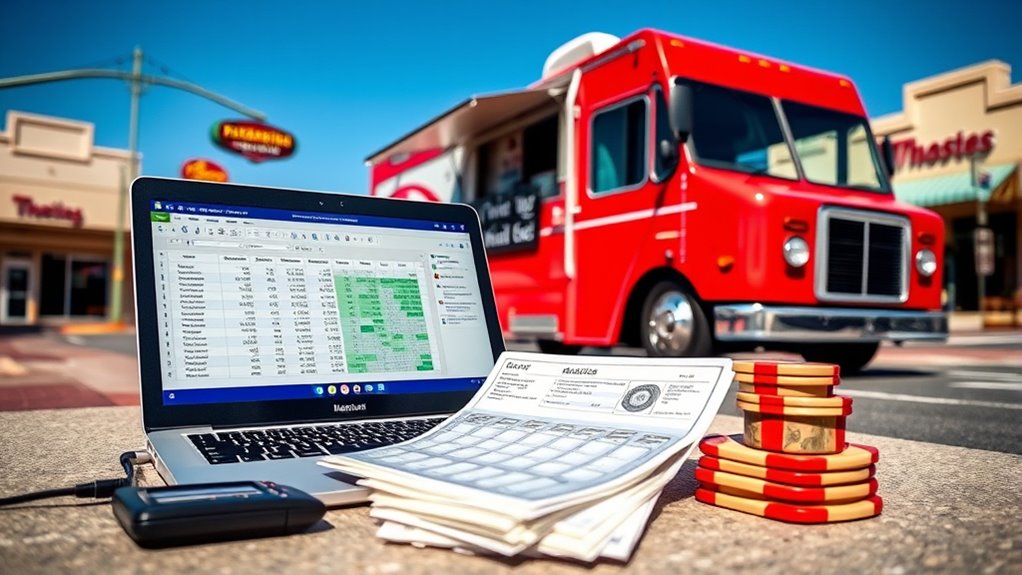
When planning your food truck, you’ll need to budget for initial vehicle modifications and branding to attract customers. You should also explore local small business grants that can help ease your startup costs. Don’t forget to include business liability insurance in your finances to safeguard your investment and ensure compliance. Incorporating wall organization systems can help keep your kitchen and storage areas efficient and clutter-free, saving you time and space during busy service hours.
Initial Vehicle Modifications and Branding
Starting your food truck journey requires careful planning of vehicle modifications and branding, especially when working within a budget. You want your truck to stand out without overspending. Focus on these key areas:
- Choose eye-catching color schemes that reflect your brand and attract customers from a distance.
- Use vehicle decals wisely to display your logo, menu, and contact info clearly.
- Opt for simple but effective modifications, like upgraded signage or custom wraps, to enhance visibility without breaking the bank.
Prioritize cost-effective options that maximize visual impact. Remember, your truck’s appearance is your mobile billboard, so strategic branding can make a big difference in attracting your target audience. Keep your branding consistent and professional to build recognition.
Local Small Business Grants
Securing the right funding is an essential step in turning your food truck idea into reality, and local small business grants can offer valuable financial support. These grants can help cover costs like food truck branding and equipment, reducing your upfront expenses. To find grants suited for your venture, research programs available in Bakersfield and California that promote small businesses or local food trends. Applying for grants requires a solid business plan, highlighting your unique menu and how you plan to engage the community. Keep in mind that grants are highly competitive, so tailor each application to meet specific criteria. Securing this funding not only eases your financial burden but also positions your food truck for long-term success in Bakersfield’s vibrant food scene.
Business Liability Insurance Essentials
Business liability insurance is a essential component of budgeting and financing your food truck, as it protects you from potential legal claims and financial setbacks. Ensuring insurance compliance and appropriate liability coverage can save you from costly disputes. To get started, consider these key aspects:
- Understand your required liability coverage limits to meet legal standards.
- Shop around for insurance policies that offer comprehensive coverage tailored to food trucks.
- Regularly review your policy to adapt to your evolving business needs and maintain insurance compliance.
Having the right liability insurance not only shields your assets but also builds trust with customers and vendors. Prioritize this essential coverage to secure your food truck’s financial stability and long-term success.
Designing Your Menu and Pricing Strategy

When designing your menu, consider using locally sourced ingredients to appeal to customers and support local producers. Calculating ingredient costs accurately helps you set prices that cover expenses while remaining competitive. Balancing quality and affordability is key to creating a successful pricing strategy for your food truck. Incorporating a variety of diverse menu options can attract a broader customer base and increase sales.
Locally Sourced Ingredient Choices
Choosing locally sourced ingredients can markedly enhance your menu’s appeal and authenticity. By forming local farm partnerships, you guarantee fresh, high-quality ingredients that resonate with customers seeking authentic flavors. Seasonal ingredient sourcing allows you to adapt your menu to the freshest produce, which can also reduce costs. To implement this effectively, consider:
- Building relationships with nearby farms to secure consistent supplies.
- Planning your menu around seasonal availability to maximize freshness.
- Promoting your use of local ingredients to attract eco-conscious customers.
Focusing on local farm partnerships not only supports the community but also elevates your food’s quality. Using seasonal ingredients keeps your menu dynamic and appealing, making your food truck a go-to destination for fresh, locally inspired dishes.
Ingredient Cost Calculations
Calculating ingredient costs accurately is essential for designing a profitable menu and setting effective prices. To do this, you need to focus on ingredient sourcing and precise cost estimation. Start by tracking the prices of each ingredient from your suppliers, considering bulk discounts and seasonal variations. This helps you establish a reliable cost baseline. Next, break down recipes to determine the exact amount of each ingredient needed per dish. Incorporate overhead costs like packaging and transportation into your calculations. By accurately estimating these expenses, you can set menu prices that cover costs and ensure profit margins. Regularly review your ingredient sourcing prices to adjust your pricing strategy as needed, maintaining a balance between affordability for customers and profitability for your food truck business.
Technology and Operations
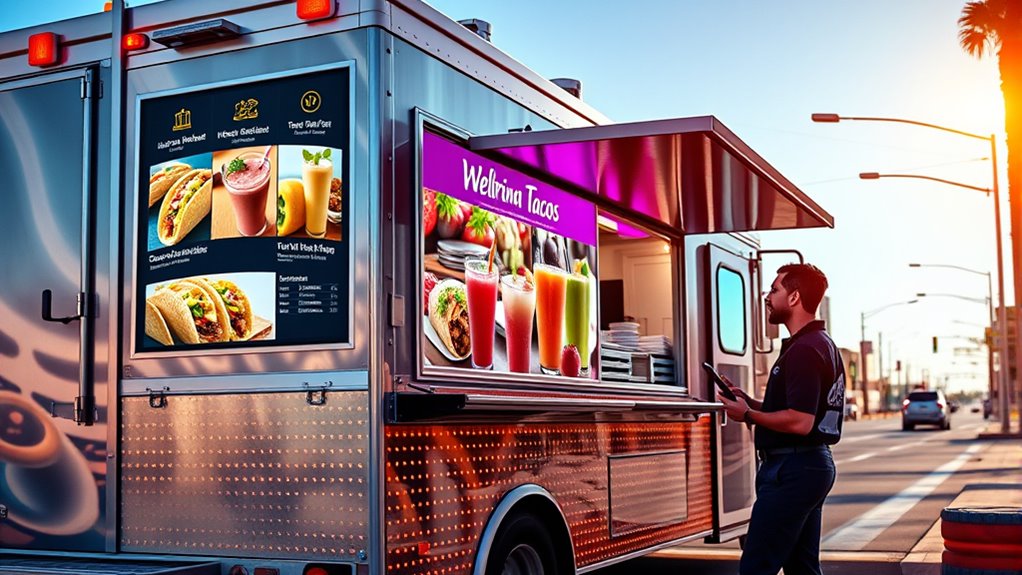
You can streamline your operations by integrating wireless card readers and mobile POS systems, making transactions faster and more efficient. These technologies help reduce lines and improve customer experience on the go. Setting them up properly ensures smooth sales and better inventory management.
Wireless Card Readers Integration
Integrating wireless card readers into a food truck’s operations streamlines payment processing and enhances customer experience. With cashless payments and contactless checkout, transactions become faster and more secure. Here’s how to maximize this technology:
- Choose a reliable wireless card reader compatible with your POS system.
- Train staff to process payments swiftly and troubleshoot common issues.
- Promote contactless checkout options to encourage quick, hygienic transactions.
This setup reduces wait times, minimizes errors, and satisfies customers craving convenience. It also allows for seamless payments during busy hours or in outdoor settings. By adopting wireless card readers, you create a modern, efficient payment environment that appeals to tech-savvy patrons and keeps your operation running smoothly.
Mobile POS System Integration
Implementing a mobile POS system transforms how your food truck manages sales and operations by offering real-time access to sales data and inventory. Instead of a traditional cash register, a mobile POS allows you to process transactions quickly and securely, even in busy environments. It streamlines inventory tracking, helping you monitor stock levels instantly and reduce waste. With seamless integration, you can update menus, prices, and promotions on the fly, ensuring consistency across all sales points. Plus, it simplifies reporting, giving you insights into best-sellers and sales trends. This technology enhances customer experience by reducing wait times and improving accuracy. Overall, a mobile POS system helps you stay organized, efficient, and ready to adapt to the fast-paced nature of food truck operations.
Marketing and Growing Your Presence

To build your presence, consider showcasing your truck at popular local event venues where lots of potential customers gather. Posting vibrant, engaging food photos on Instagram can attract attention and encourage followers to visit. These strategies can help you stand out and grow your customer base in Bakersfield.
Popular Local Event Venues
Hosting your food truck at popular local event venues is a smart way to boost visibility and attract new customers in Bakersfield. These venues draw crowds enthusiastic to try new flavors, giving you a prime opportunity to enhance your food truck branding and showcase your unique offerings. To maximize impact, consider these ideas:
- Partner with event organizers to secure high-traffic spots aligned with local culinary trends.
- Offer limited-time menu items exclusive to events, creating buzz around your brand.
- Use eye-catching signage and decor that reflect your food truck’s personality, drawing attention and reinforcing your brand identity.
Engaging Instagram Food Photos
Capturing stunning, mouth-watering photos of your food on Instagram is essential for growing your food truck’s presence. Focus on good food styling to make dishes look irresistible; arrange ingredients thoughtfully and highlight vibrant colors. Pay attention to photography composition—use the rule of thirds, leading lines, and symmetry to create balanced, eye-catching shots. Natural lighting works best, so shoot during daylight hours, avoiding harsh shadows. Experiment with angles—overhead shots work well for platters, while close-ups emphasize textures. Keep backgrounds clean and clutter-free to keep the focus on your food. Consistent, high-quality images will entice followers and encourage shares. Engaging visuals paired with strategic food styling and thoughtful composition can turn casual scrollers into loyal customers.
Navigating Bakersfield’s Food Scene
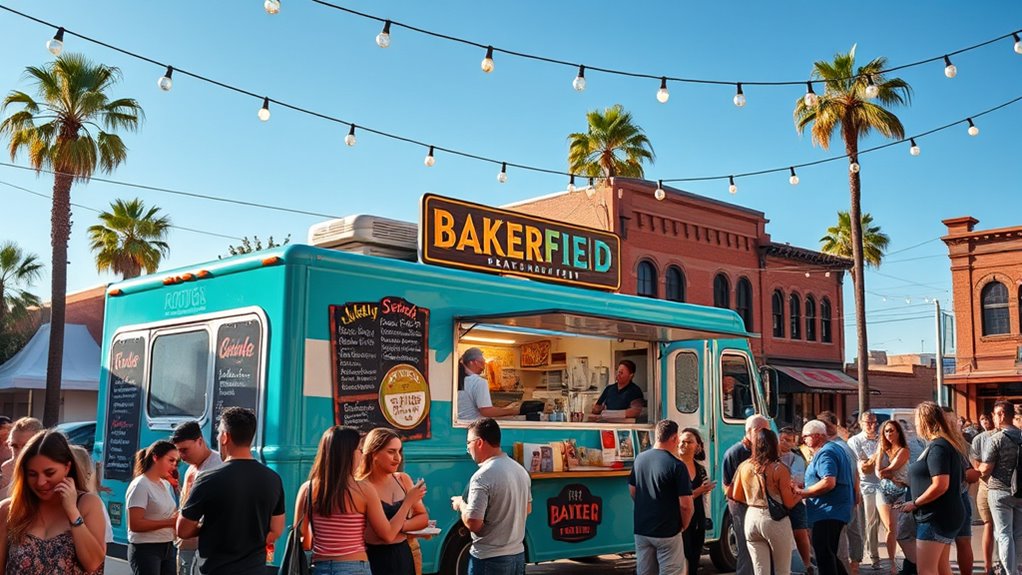
Bakersfield’s vibrant food scene offers a variety of flavors that are easy to explore once you know where to look. To navigate successfully, focus on understanding local food trends and how food truck branding appeals to your audience. Here are three tips:
- Research popular local dishes and incorporate them into your menu to attract loyal customers.
- Use eye-catching branding that reflects Bakersfield’s culture and your unique style.
- Stay updated on food trends to keep your offerings fresh and relevant.
Frequently Asked Questions
Are There Specific Health Codes Unique to Bakersfield for Food Trucks?
Yes, Bakersfield has specific health codes for food trucks that align with California’s health inspection standards. You need to follow local food safety regulations, including proper food handling, sanitation, and storage practices. Bakersfield health inspectors may have additional requirements, so it’s essential to stay updated with the city’s health department. Ensuring compliance helps you pass inspections smoothly and maintains the highest standards for your mobile food business.
What Permits Are Required for Daytime and Nighttime Food Truck Operations?
In Bakersfield, you’ll need specific food truck permits for both daytime and nighttime operations. About 80% of mobile vendors secure these permits to stay compliant with local regulations. You must obtain a food truck permit from the Bakersfield health codes department, which covers health and safety standards. Plus, check if you need additional permits for late-night hours, ensuring your food truck runs smoothly day and night without issues.
How Do I Find Approved Parking Spots for My Food Truck?
You find approved parking spots by researching Bakersfield’s parking regulations and zoning laws online or at city offices. Use location scouting to identify busy areas like downtown, events, or near popular attractions, guaranteeing you comply with local restrictions. Contact the Bakersfield Parking Authority or local business districts for designated food truck zones. Always verify each spot’s rules beforehand to avoid fines and ensure smooth operations.
What Are the Staffing Requirements for a Successful Food Truck Business?
You need a small, dedicated team to run your food truck smoothly. Staff training is essential to guarantee everyone understands food safety and customer service standards. Efficient employee scheduling helps you cover busy hours without burnout. You should aim for at least 2-4 staff members per shift, depending on your menu size and hours of operation. Keep training ongoing and adjust schedules to meet demand, ensuring your business stays successful.
How Can I Build Relationships With Local Bakersfield Vendors and Suppliers?
Ironically, the easiest way to build relationships with Bakersfield vendors is to just show genuine interest. Attend local events, join vendor networks, and frequent their shops. Be reliable and supportive, and you’ll find that supplier partnerships naturally develop. By actively engaging with the community and offering mutual benefits, you’ll forge strong, lasting relationships that help your food truck thrive in Bakersfield’s vibrant local scene.
Conclusion
Launching your food truck in Bakersfield is like steering a well-tuned engine on a vibrant freeway—you’ll need direction, preparation, and a passion for flavor. With the right steps, you’ll navigate the local scene smoothly and turn your dream into a thriving reality. Keep your eye on the road ahead, stay adaptable, and savor every success along the way. Before long, your food truck will be a true culinary landmark in Bakersfield’s bustling street food landscape.
